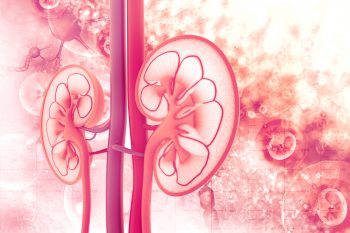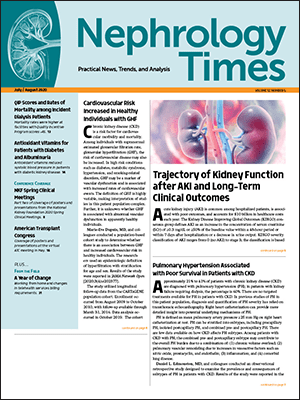
Patients with chronic kidney disease commonly develop metabolic acidosis and are at increased risk for complications including rapid progression to kidney failure and altered bone and muscle metabolism. Oral alkali therapy may be indicated for treatment of patients with metabolic acidosis; however, there are few data available on treatment rates and patterns of discontinuation of oral alkali therapy in population-based cohorts.
Navdeep Tangri, MD, PhD, and colleagues conducted a retrospective cohort study designed to examine treatment patterns and to document adherence of individuals with CKD stages G3-G5 who initiated oral alkali therapy. Results were reported during the NKF 2020 Spring Clinical Meetings in a presentation titled Metabolic Acidosis Is Undertreated in Patients with Chronic Kidney Disease.
The study included adult patients in Manitoba, Canada, who had at least one measurement of both serum bicarbonate and serum creatinine from April 1, 2006, to March 31, 2018. Inclusion criteria were first estimated glomerular filtration rate (eGFR) measurement <60 mL/min/1.73 m2 and serum bicarbonate test available within 180 days. The study defined chronic metabolic acidosis as serum bicarbonate value between 12 and 22 mEq/L. Data on new prescriptions for oral alkali were universally captured through a provincial formulary. The researchers conducted time to event analyses for discontinuation of oral alkali and used the log-rank test to compare the results to statins in the same population.
In total, there were 40,133 individuals with CKD (mean eGFR, 31 mL/min/1.73 m2) and a qualifying serum bicarbonate test. Of those, 13.4% (n=5368) had metabolic acidosis and 561 initiated a new oral alkali prescription during the study period. Among the patients in the oral alkali group, median time to discontinuation was 6 months; 68% had discontinued therapy at 1 year. Results of time to event analyses suggested that patients on both oral alkali and statins were more likely to discontinue the oral alkali earlier than the statin (P<.001).
In conclusion, the researchers said, “Chronic metabolic acidosis is undertreated in individuals with CKD. Discontinuation rates of oral alkali therapy are high and suggest that this treatment is not well tolerated compared with a negative control exposure.”
Source: Tangri N, Nourmohammadi M, Ferguson T, Komenda P, Whitlock R. Metabolic acidosis is undertreated in patients with chronic kidney disease. Abstract of a presentation at the National Kidney Foundation 2020 Spring Clinical Meetings (Abstract #264).







 © 2025 Mashup Media, LLC, a Formedics Property. All Rights Reserved.
© 2025 Mashup Media, LLC, a Formedics Property. All Rights Reserved.